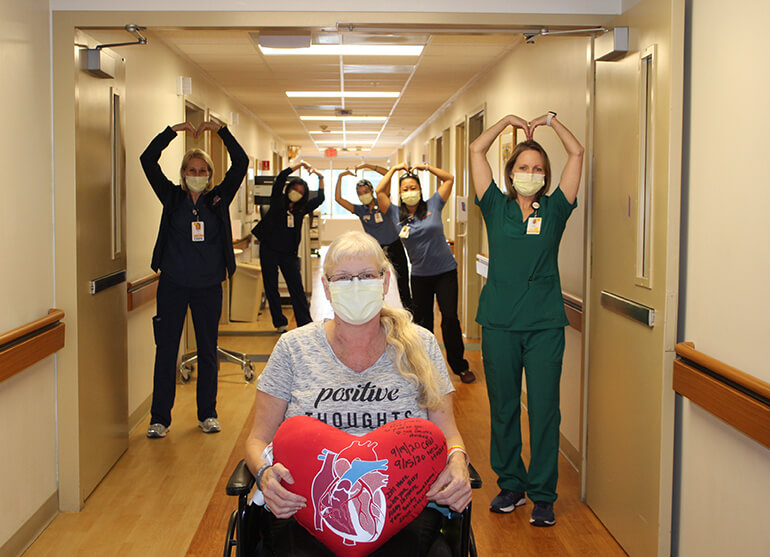Cardiac Rehabilitation: Taking Recovery to Heart

“The staff goes out of their way to customize what you need to go home. They all push you to be your best. They helped me learn how to care for myself and always came with a smile and words of encouragement.”
Greg F.
Heart transplant survivor
Over 800,000 Americans die each year from a heart-related event – that’s one out of every three deaths in the United States, according to the American Heart Association.
Individuals who survive a heart attack, congestive heart failure, heart transplant or other cardiac-related illness or incident are often scared, uncertain and anxious about the future. Their loved ones too are concerned about care and recovery.
Cardiac rehabilitation – or cardiac recovery – is a way forward for survivors and their families.
What is cardiac rehabilitation?
Cardiac rehabilitation is a medically supervised set of actions that improve a patient’s cardiovascular health.
In the case of cardiac incidents, rehabilitation may start while the patient is hospitalized. Inpatient cardiac rehabilitation helps improve heart health and overall wellness so the patient can maximize his/her recovery, regain independence and quality of life.
Cardiac rehabilitation is achieved through exercise, therapy, and wellness support. When needed, it also includes education and/or counseling to boost good health habits, like appropriate food choices.
With this approach, patients build strength and confidence. They also improve their chances of avoiding complications and future hospital admissions.
Who benefits from cardiac rehabilitation?
Cardiac rehabilitation isn’t just for those who have suffered a cardiac-related event. It can help restore strength and function in people who have had a cardiac procedure, like a heart transplant, or have a chronic health condition that may have weakened the heart. Individuals who are medically stable and can tolerate some physical exertion may benefit from cardiac rehabilitation whether pre- or post-surgery.
With an inpatient cardiac rehabilitation program, patients and their families can expect rigorous therapy, 24-hour nursing care, close physician oversight and an interdisciplinary team of clinicians who work with the patient toward:
- Healing
- Managing pain
- Recovering function
- Building endurance
“The team always has the patient in mind and goes the extra mile. They make you feel comfortable, taking time to explain everything. I’m just so grateful for the care I received.”
Bruce T.
Aortic aneurysm/open-heart surgery survivor
Cardiac care teams at-a-glance
Planning for cardiac rehabilitation and recovery is a team effort.
The care team is focused on getting patients back to the things they love. Expect to see a core team of:
- Physicians who coordinate the cardiac recovery plan and collaborate with any needed specialists
- Nurses who treat symptoms, monitor vital signs, help with mobility, medications, wound care and dressing changes
- Physical therapists who work to improve strength, endurance, mobility and exertion tolerance and teach tactics for energy conservation
- Occupational therapists who teach new ways of handling daily living activities like bathing, grooming, dressing, and toileting
Patients may also receive specialty therapy services*, if needed:
- Speech and language therapists who address swallowing or speech issues and help with cognitive challenges such as concentrating, decision-making or learning
- Dietitians who monitor nutrition and educate those who have been prescribed special diets
- Psychologists who assess and treat mental, social, and/or emotional health needs
- Pharmacists who manage any prescribed medication in association with a cardiac diagnosis
Depending on a patient’s needs, inpatient cardiac rehabilitation may also include education on dealing with health risks, including smoking cessation, weight and/or stress management. The interdisciplinary team, led by a physician, will meet weekly to assess a patient’s status and progress toward their goals and return home.
“We begin preparing for a patient’s discharge at admission,” says Brian Fritz, PT, DPT, regional director of rehabilitation for Select Medical’s inpatient rehabilitation division. “We do not keep patients long-term in the hospital.”
“Our success is in discharging patients back to the community appropriately and safely.
Weimar M.
Soccer fan, salsa dancer/Above knee amputee
Before discharge, our clinical team works with patients and families to prepare for care at home. HonorHealth Rehabilitation Hospital believes the partnership that started in our hospital needs to continue at home.
Our family training program places patients on a path to success, building on the progress made during an inpatient rehabilitation stay.
“The therapists explained everything. They made me feel at ease and made therapy fun, not just a task. The team very much exceeded my expectations. Everyone was so encouraging.”
Debra H.
Heart transplant survivor
Surviving a cardiac event is life-changing. Going through cardiac rehabilitation can help heal your heart. Sticking with a post-rehabilitation program that continues to support heart health can change and extend your life.
Learn more about HonorHealth Rehabilitation Hospital's commitment to your rehabilitation experience and journey.
*Not available at all hospitals.